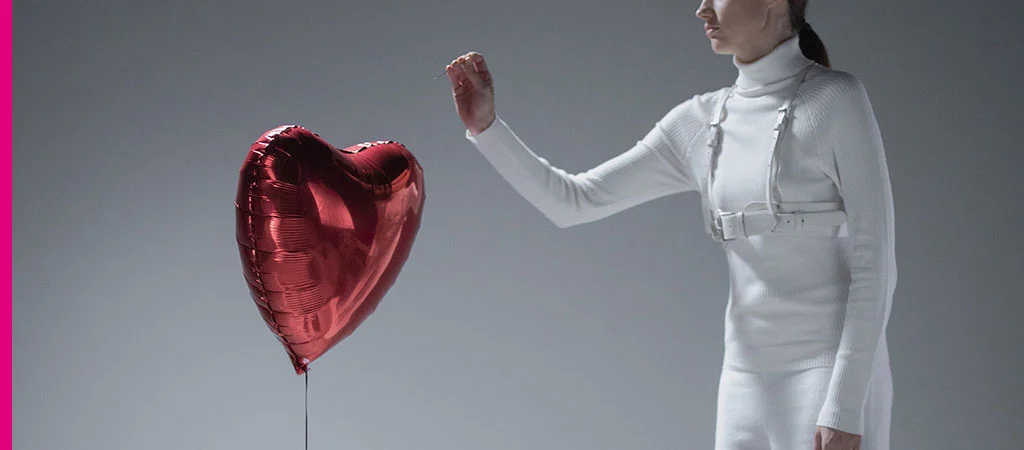In a world where dating apps and casual hookups are common, it can feel like true love is slowly disappearing. Instead of impassioned love letters and elaborate gestures, we swipe left or right to establish ephemeral connections in a sea of unlimited alternatives. But why does it seem that romantic love is disappearing? Is it because societal values have shifted? Or perhaps our own fear of vulnerability has led us to settle for less meaningful relationships? In this article, we will dive deep into the reasons behind this perceived disappearance of romantic love and explore whether true love can still be found in our modern age.

The changing landscape of modern love
The changing landscape of modern love can be seen in the rise of online dating apps and the fading stigma associated with meeting partners online. With busy lifestyles and limited opportunities to meet new people in person, digital platforms have become a convenient way to find love. Nevertheless, this transition has also presented novel obstacles. The abundance of choices and superficial swiping culture may lead to a sense of disposability, making it harder to establish meaningful connections.
Table of Contents
Moreover, modern love is being redefined by shifting societal norms and evolving gender roles. Traditionally held expectations – such as men being the primary breadwinners or women being solely responsible for domestic duties – are being challenged. Financial and home duties are now shared more evenly by couples. This transformation fosters deeper closeness, trust, and fulfilling relationships based on mutual support and understanding.
In conclusion, the changing landscape of modern love reflects our desires for convenience while challenging traditional norms. Online dating offers opportunities but requires navigating through potential pitfalls of choice overload. Embracing gender equality expands our possibilities for genuine connection beyond rigid roles that hinder personal growth or restrict individuality within relationships.
Technology and the erosion of intimacy
Technology has undeniably transformed the way we communicate, revolutionizing our relationships, both platonic and romantic. But as our devices become extensions of ourselves, the erosion of intimacy becomes palpable. While social media connects us to countless individuals worldwide, it also accentuates our isolation and prevents meaningful connections from forming. The constant need for validation through likes and comments distracts us from building genuine relationships based on trust and emotional depth.
Moreover, technology’s advancements have invaded even our most private moments. Intimacy which was once cherished in privacy is now often shared with the world. From couples sharing intimate details of their relationship on social media to sexting becoming the norm rather than an exception, technology has degraded the sacredness of intimacy. As we swipe right or left in pursuit of love, we risk missing out on real connections by basing judgments solely on appearances instead of focusing on personalities and values.
As technology continues to advance at an astonishing pace, it is essential to reflect on its impact on human intimacy. While it connects us in extraordinary ways, allowing us to transcend geographical boundaries and communicate effortlessly across cultures, it also divorces us from authentic interactions that foster deep bonds and emotional growth. Striking a healthy balance between utilizing technology for connection while still prioritizing face-to-face interaction remains crucial in preserving meaningful relationships in this digital age. It is time we recalibrate our attitudes towards technology’s role in nurturing true intimacy instead of allowing it to degrade what makes human connections so special.
Societal pressures and shifting priorities
Social pressures assault us from all sides in today’s fast-paced, ever-changing environment. Society expects us to have a good career, a perfect body, and a picture-perfect life on social media. However, more people are questioning these social constraints and reassessing their priorities.
Growing understanding of mental health and well-being drives this shift in priorities. People are understanding that financial achievement and validation can harm mental wellness. Thus, people now prioritize self-care, personal growth, and healthy relationships over outward successes.
The search for work-life balance also contributed to this transition. Many people feel overwhelmed by their employment due to technology blurring work and personal life. People are starting to emphasize their well-being over traditional ideals of success and asking if sacrificing personal pleasure for professional growth is worth it.
In conclusion, societal pressures have long dictated our priorities, but there is an increasing trend towards challenging these expectations in favor of individual well-being and fulfillment. This shift reflects a greater understanding that true success should be defined by what brings us joy and contentment rather than external markers imposed on us by society.
The rise of casual dating culture
The rise of casual dating has changed the dating landscape in recent years. Time has passed since romance and commitment were paramount. We live in an era where people value personal freedom and discovery over long-term relationships.
The growth of technology and social media is a big element. Dating apps make meeting new people without committing easier than ever. A few swipes can connect one with people who share similar interests or seek a casual meeting. This accessibility has made casual dating more socially acceptable and attractive for many.
Moreover, our fast-paced modern lifestyles also play a role in nurturing this culture of casual dating. People today are often balancing demanding careers, friends, family obligations, and personal interests. In such a busy world, committing to someone may feel overwhelming or impractical for some individuals. Casual dating provides an outlet for companionship without sacrificing one’s own autonomy or drowning in traditional relationship commitments.
Overall, as society continues to evolve and prioritize individual desires over societal norms, it is no surprise that we witness an upsurge in casual dating culture. The convenience offered by technology paired with changing attitudes towards relationships have reshaped how we approach romantic connections today – emphasizing personal fulfillment over long-term commitments.
Fear of vulnerability and commitment
The fear of vulnerability and commitment can be deeply rooted in our past experiences. It stems from the fear of getting hurt or rejected, so we build up walls to protect ourselves. However, these walls also prevent us from experiencing true intimacy and connection with others. When we are unwilling to be vulnerable and commit to another person, we miss out on the depth and richness that come from fully investing ourselves in a relationship.
Let go of control and embrace uncertainty before committing. It involves accepting joy and sorrow. Many people dread vulnerability because they fear losing their independence or sense of self. By committing to someone else, we fear losing part of ourselves. But when we approach commitment with an open mind, it may help us grow and empower us to love and connect.
In conclusion, the fear of vulnerability and commitment is understandable but limiting. By acknowledging our fears and pushing through them, we can experience love in its fullest form. It takes courage to lower our defenses and let someone see us for who we truly are. And while no relationship is without its challenges or risks, the rewards that come from being vulnerable are immeasurable – deep connections built on trust, reciprocal support in navigating life’s ups and downs, and ultimately finding fulfillment within a committed partnership.
The impact of social media on relationships
Social media has changed how we interact, but how does it affect our relationships? It can also improve connectivity and long-distance relationships, but it also has drawbacks. Constant exposure to the highlight reels of others’ lives can lead to feelings of jealousy or inadequacy, creating unnecessary tension in our own relationships. Moreover, social media’s addictive nature can cause individuals to prioritize virtual interactions over real-life connections, leading to a lack of emotional intimacy with their partners.
One aspect often overlooked is how social media affects trust in relationships. With platforms like Facebook and Instagram serving as breeding grounds for insecurity and suspicion, it is no wonder that trust issues are on the rise. Innocent likes and friendly comments can be interpreted as signs of infidelity or betrayals of trust. In this digital age where everything is documented online, couples may find themselves constantly questioning each other’s loyalty beyond what is healthy or necessary.
On a positive note, social media presents new opportunities for couples to express affection publicly and create shared memories with their online communities. From publicly declaring love through anniversary posts to capturing cherished moments in photos or videos, these virtual displays of love can strengthen the bond between partners while also receiving validation from others. However, finding a balance between sharing moments online and keeping some things private is crucial in order to preserve intimacy within the relationship.
Conclusion: why does it seem that romantic love is disappearing?
As a result of social and cultural developments, passionate love is evolving. Technology and virtual interactions may undermine traditional romance, but many people still want deep ties and close intimacy.
Love has also changed how we express and experience it. People are rethinking romantic relationships as they focus more on autonomy and self-exploration. This does not mean romantic love is declining, but rather that it is diversifying.
Consider that personal experiences and media narratives may influence the sense of romantic love’s departure. Movies and writings may idealize modern society as less romantic. However, real-life partnerships persist despite these obstacles.
Finally, romance may be expressed and experienced differently today than in the past, but this does not mean it has disappeared. Romance is a universal urge that evolves with our reality.



[…] is when people say things like “my love.” In some cultures, this term can be used to describe a love relationship, but in other cultures, it can mean something […]